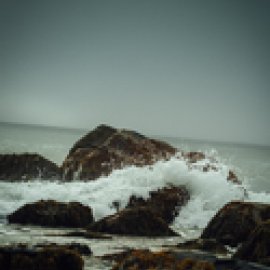RESCUE, part 16: Technology and Ocean Farming
-
English
-
ListenPause
[intro music]
Welcome to World Ocean Radio…
I’m Peter Neill, Director of the World Ocean Observatory.
Modern agriculture -- farming the land -- has been a paradoxical contributor to human sustenance and health. The transformation of small farming to large industrial enterprise, driven by fossil fuel-based fertilizer, enabled us to feed our rapidly growing national population and to create food grain as a major export and source of corporate revenue. But, as always, there are now revealed the unforeseen health and social consequences of the consumption paradigm as applied to food and farming. The two most serious outcomes have been: first, the emissions generated by fossil fuel driven fertilizer production and run-off that has poisoned our air and watersheds and, second, the destruction of the small farm model as a source of community and social coherence. Government subsidies added to this impetus, and the full consequence of the process has only recently become too clear and concerning. The pressure to feed ourselves and others is no less demanding, and now we are turning to the ocean to make up the difference, in danger of applying the same financial principles and unsustainable behaviors to harvest from the sea.
The problem of unrestricted, unregulated fishing is already well known. The ocean, nonetheless, remains an essential, ongoing source of protein, but only if we change the values, structures, and behaviors applied to farming the marine environment. There are signs of progress. In Iceland, there are laws requiring the use of 100% of the fish,” requiring that no part of fish caught can be tossed overboard as by-catch, that a utility for every part be developed. An amazing wave of invention and enterprise has followed, with new small businesses offering new fish-based cosmetics, bandages for cuts and burns, fishbone pro-biotics, even ice cream and clothing made from what before was considered nothing but waste.
Lobster fishing is an example of a sustainable fishery, limited by number of fishers and pots, by season, by size and gender, and, now even more so by conflict with other marine interests, the preservation of right whales among them. Offshore fish farms are another innovation, fraught with problems of fish food and fertilizer waste, opposition by the lobster industry and shoreline residents, who object to area restrictions and lights and other intrusions on their shoreline views. Norway, however, has somehow addressed all these objections, upgrading the process, waste control, disease, and coastal location, to create a profitable industry. Most salmon available in the United States is a product of fish-farming there or in other European or Asian waters. Shrimp, tilapia, mussels, oysters, even eel, sea urchins and abalone, are becoming more and more available as the outcome of ocean and coastal aquaculture. The future of these processes may be moving back to the land, coastal, closed system fish factories that obviate some of the objections to in-water farms, but even those have found opposition from coastal towns and conflicting interests. Paradox remains: and we must remember that the entire ocean fishing industry worldwide is still subject to the growing hazards of global warming and sea temperature rise, increasing acidification, oxygen-depletion, extreme weather, ongoing habitat destruction, inflated fuel and transportation costs -- all testing the limits of exhaustion, each a possible, perhaps now probable source of sudden change and ecosystem collapse.
Seaweed is next, and today it is becoming another, perhaps less vulnerable area for marine food development. In Japan and Southeast Asia and alongshore in the US, there is growing enterprise and market demand for seaweed as a high nutrition food source with proven impact on human health. Long life expectancy in Japan is attributed to high consumption of seaweed over time. Medical studies are examining the influence of seaweed components in relation to cancer, cardio-vascular disease, metabolic syndrome and weigh management, diabetes, digestive tract health, bone density, and anti-viral properties. As seaweeds are rich in bioactive compounds not present in terrestrial food sources, they represent a new approach toward understanding and treating disease, ironically caused by over-consumption of past agricultural practice and product.
Concurrently, seaweed-based food products are becoming more and more prevalent in health food stores and large supermarkets in the form of kelp burgers and artificial crab cakes, seaweed pasta, breakfast sausage, nori sheets for soups, and all sorts of pro-biotics – evidence of a fast growing movement away from an industrial, chemically enhanced meat diet toward plant-based foods, seaweeds, beans, mushrooms among them, produced by natural, regenerative farming, expanded distribution, and greater public acceptance.
Seaweed is ubiquitous in the marine environment, as harvestable plant and algae. It can be grown sustainably as long as regenerative harvest practices are maintained and limited. It can be new work for our young entrepreneurs, better food for our children, renewed viability for our coastal communities, and a major contributor toward our personal and public health – all demonstration of RESCUE: R for renewal; E for environment; S for society; U for understanding; and E for engagement.
We will discuss these issues, and more, in future editions of World Ocean Radio.
[outro music]
This week the multi-part RESCUE series continues with an advancement of the sub-theme of technology. We're talking about the pitfalls of modern agriculture, examples of sustainable fisheries, and the innovative ways that we might farm the marine environment that positively impact human health and have a regenerative, sustainable response to our harvest and use. RESCUE as an acronym offers a plan for specific action and public participation: Renewal, Environment, Society, Collaboration, Understanding, and Engagement.
About World Ocean Radio
5-minute weekly insights dive into ocean science, advocacy and education hosted by Peter Neill, lifelong ocean advocate and maritime expert. Episodes offer perspectives on global ocean issues and viable solutions, and celebrate exemplary projects. Available for syndicated use at no cost by college and community radio stations worldwide.
Image
Photo by Tim Foster on Unsplash
@timberfoster
- Login to post comments



